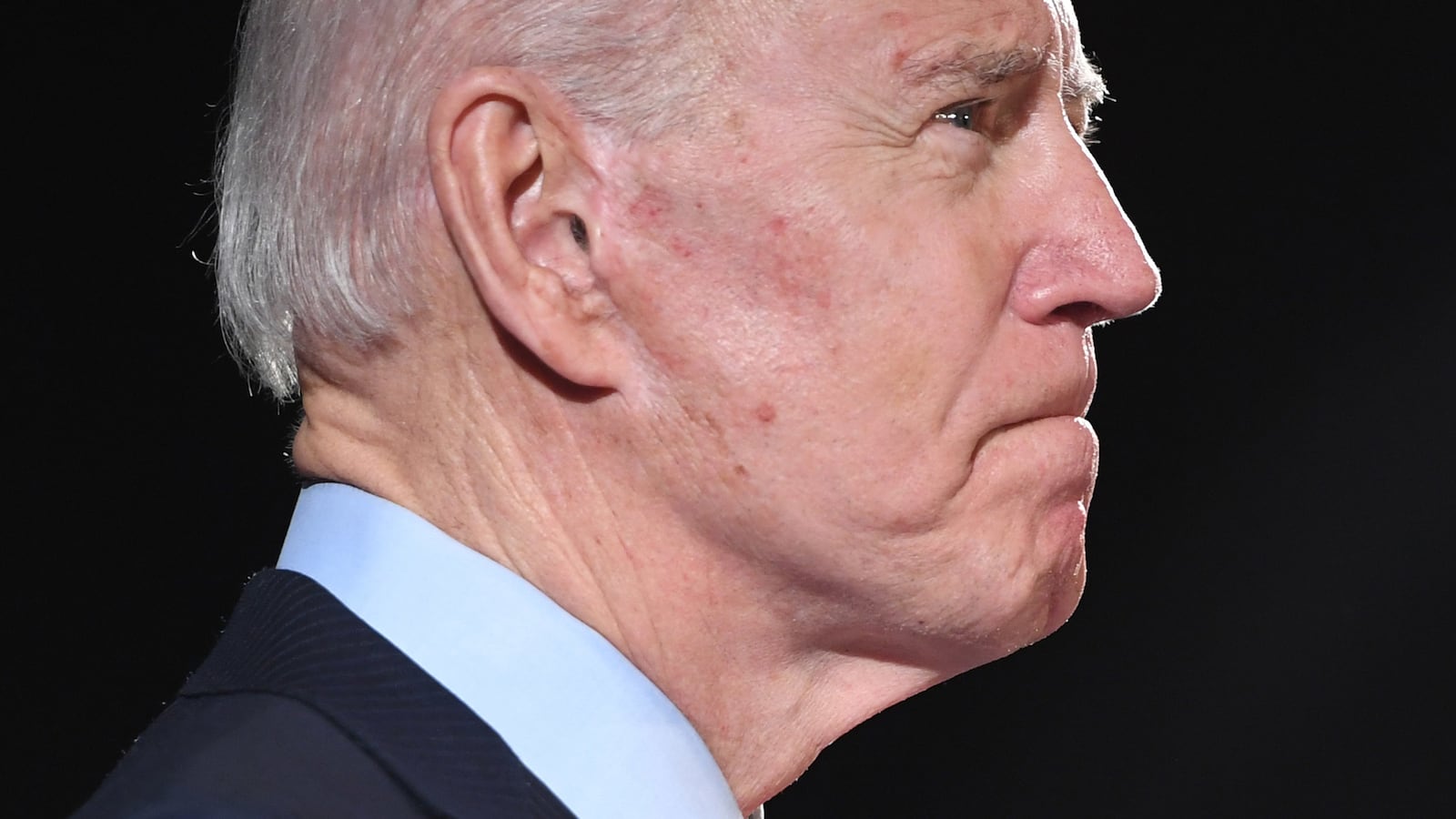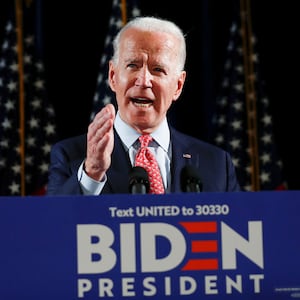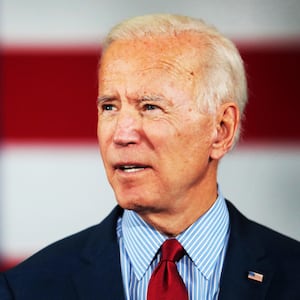Joe Biden’s campaign is already struggling for money. Now, as it gears up to take on a president and his allied party apparatus, with an unprecedented war chest at their disposal, it faces a new hangup of its own making.
The Democratic Party’s decision to postpone this summer’s presidential nominating convention over concerns about the longevity of the coronavirus outbreak has put a pot of money a bit further out of reach for the presumptive Democratic nominee. That’s because instead of getting access to funds for the general election on the initial convention date—July 16—Biden must wait until mid-August, when the convention now is planned to go forward in Milwaukee.
The move came after Biden himself called for postponing the convention, hoping to accommodate public health concerns that have shuttered a massive chunk of the U.S. economy. And his campaign said that they do not fear the month-long period of access to general election funds that they now must forgo
“We can still raise and spend primary money. And raise general election money—just not spend it,” noted Anita Dunn, one of the campaign’s top operatives. “This convention will be a week earlier than Obama’s 2008 convention.”
But while others in the party shared a bit of that optimism, they also conceded that it would take a bit of dexterity to help fill the new hole they’d dug.
“If [Republicans] decide to unload on Biden in July, the question is, can the super PACs pick up the slack?... Can the state party fundraising and the DNC fundraising make up the month long gap in general election fundraising?” said Addisu Demissie, who ran Sen. Cory Booker’s presidential campaign. “Certainly I don't think the Biden campaign can. But that's why super PACS exist.... So, as long as you are getting blown out on the airwaves you will be fine.”
Under federal campaign finance law, individual donors to federal political campaigns are limited to $2,800 per election. Primary and general elections are considered separate contests, so donors can give a total of $5,600 to a presidential campaign. But the campaign can only spend the general election portion of those funds once the nomination is secured.
The postponement of the Democratic convention means that Biden will have to wait longer to access the pool of funds that max-out campaign contributors have donated to that pool of general election cash.
The amount of money in Biden’s campaign account currently earmarked for the general is not huge—roughly $736,000 as of February 29, according to campaign finance data provided by the Center for Responsive Politics. That’s a small portion of the roughly $12 million the campaign was sitting on at the end of February.
But the amount of potential fundraising waiting in the wings for Biden if, as expected, he secures the nomination is massive. Roughly 6,400 donors have given the $2,800 maximum to Biden’s primary campaign, but have yet to give to his general election fund, according to Federal Election Commission records. If every one of them matched their donations to his general election account, it would mean a windfall of nearly $18 million. That’s money that Biden wouldn’t be able to touch until August.
A notoriously middling fundraiser, Biden raised just under $90 million through February, according to FEC records—totals that put him behind five of his primary opponents. If he secures the nomination, he’ll be going up against an incumbent president and a Republican Party that has put up huge fundraising numbers. The Trump campaign alone raised more than $230 million in 2019 and the first two months of 2020. The Republican National Committee has raked in nearly $300 million.
And unlike Obama in 2008, Biden will be facing off against an incumbent who hasn’t had to battle through a competitive—and expensive—primary contest. The Trump campaign and the RNC boasted a combined $170 million on hand at the end of February. That was nearly five times what Biden and the DNC collectively had in the bank.
A more comparable race, political veterans say, may be 2012, in which Mitt Romney’s presidential campaign was forced to wait painstaking weeks to access general funds, during which time Obama’s re-election effort bombarded him with negative ads. Looking back, said Stuart Stevens, Romney’s top strategist on the race, that blitz defined Romney in a negative light for the rest of the election.
“In June and July of 2012, Obama spent more on television that Kerry and Bush spent combined in their entire campaigns,” Stevens told The Daily Beast via email? “Did it matter? It sure felt like it did. Romney was forced to borrow $30 million just to have some presence on the air and we were still outspent 4 to 1 in every key market. Sometimes 4 to 0.”
Stevens, a Trump critic, conceded that Biden is probably better positioned than Romney was in 2012, despite facing some similar financial obstacles. “Romney had maxed out so many donors in the primary and the funds were used for the primary fight that it was harder to find new donors who had not donated to the primary,” he explained. “Biden has more room to grow.”
Biden will also benefit from changes to campaign finance laws in the years since Romney’s and Obama’s presidential campaigns. The landmark 2014 Supreme Court decision in McCutcheon v. FEC dramatically increased the amount of money that individual donors can give to an array of state and national party organs. So even donors who max out to the Biden campaign can also give generously to other entities that will work, both before and after the convention, to support the campaign.
Those party-backed activities will likely support Democrats’ political operation in November but the money donors provide to them won’t directly mitigate Republican efforts to define Biden in the eyes of the public through advertising and paid media. There too, however, Biden may have an advantage over previous Democratic nominees.
Such messaging work commonly takes place through independent expenditure groups, where Democrats have built capacity significantly since 2012. Super PAC Priorities USA raised just under $80 million to back Obama’s reelection. This cycle, it’s looking to bring in $200 million. Guy Cecil, the president of the super PAC, told The Daily Beast that they were aware that the longer primary period would require them to help fill a deeper void.
“Relative to all of the challenges, it is small, but we will need to make sure we have the resources to expand our work,” he explained.








